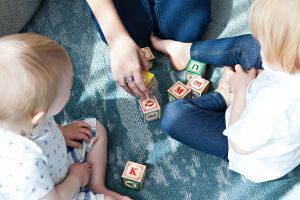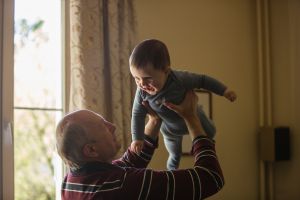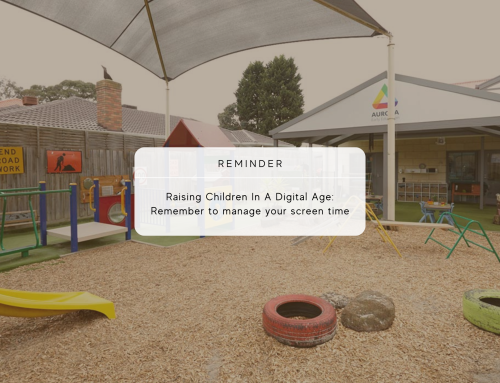Aurora aims to provide a holistic environment for our children that is constantly evolving to suit their learning and behavioural changes as they develop. We stay updated with new information and research as much as possible and apply findings to our regular practices. Doing so helps us enhance our approaches toward our children and give them the best treatment they need to successfully develop.
Each month, we explore studies that have been published over the past month that reveal significant findings that could help parents and the early education community. In June 2022, these studies explore the benefits of peer play for mental health, coding in early learning, grandparent care, and more investments in ECEC.
Children with confident peer play abilities have better mental health outcomes

The Sector recently reported on research conducted by the University of Cambridge, which found that children who are able to get along well with their peers and play during their preschool years are more likely to have stable mental health experiences as they grow older.
After looking into the data of nearly 2000 children between the ages of three and seven as part of the Growing Up Australia study, researchers identified that ‘peer play ability’ prove that there is a protective impact on mental health. This resulted in children having lower hyperactivity after four more years along with fewer signs of poor mental health, they were also able to avoid and deal with disagreements with parents, teachers and other children.
At Aurora, we encourage parents and educators to properly assess their children’s playing habits early on and give them the support they need to screen for the potential risk they may have of experiencing mental health challenges in the future. Therefore, building on high-quality peer play in a variety of subtle yet effective ways can help children have better mental health outcomes as they develop.
Children are encouraged to learn coding in early childhood

Recent research by Jo Bird, a senior lecturer at the University of New England, shows that there is a lot to learn from coding in early childhood. The ability to code is currently classified as a 21st-century skill that will help young children significantly contribute to the community by broadening their general knowledge for their tomorrow.
An evidence-based review by the NSW government details that computational thinking should now be considered in preschool regarded in the same way reading and maths are. This review proved that the manner in which children are exposed to digital technologies can affect their focus on how they build up their knowledge and skills for those tools.
In Bird’s research, which was shared on The Sector, she found the use of Cubetto, an award-winning children’s game that teaches the basics of computer programming through play a beneficial tool to ease the introduction of coding into children’s environments. Such tools will help prepare children for the appropriate use of coding and further research will help facilitate more guidelines and technologies for suitable use of coding in children’s lives.
Aurora is always welcoming new methods to progress our children’s knowledge and skills. And while we do try our best to limit screen time, we understand that in today’s age our children will inevitably have more exposure to digital technology than any other generation before as this is all part of the world they will be growing up in. Therefore, with formal education on how to appropriately use such tools, children will be well-prepared to tackle their academic challenges as they grow older.
Read the full article here.
Grandparent care requires more recognition according to new research

Researchers from the University of SA conducted a study, which was also published on The Sector, that investigated the relationship Australian families have with grandparent figures. They found that strong bonds between grandparents and children result in benefits for the whole family and young children get to connect with their culture and family history in a deeper and more meaningful way.
Professor Marjory Ebbeck claims that grandparents are critical caregivers in society and deserve more acknowledgement. The wisdom, knowledge and values they share with the community are universal and always advantageous to the upbringing of young children.
Not only do such intergenerational ties impact the way future citizens turn out, but it also affects the grandparents in feeling more involved and purposeful thus creating a synergy across generations. This is why at Aurora, in addition to prioritising our children and parents through our everyday practice and our Children Advisory Board (CAB) and Parents Advisory Group (PAG) we also prioritise the grandparents present in our community by encouraging family bonding and having our very own Grandparents Advisory Board (GAB) for grandparents to share their input and contribute to the value of the children’s care.
Along with that, we also incorporate what we call intergenerational activities, where we encourage our children to connect with elderly community members through fun activities like storytime for instance.
Find the full research paper here.
More investments in ECEC will help support poverty circumstances

Earlier in June, The Sector wrote about the World Bank issuing a report reviewing the science of early learning and is providing practical advice to enhance the principles and key elements of Early Childhood Education & Care in quality and reassurance.
A program called ‘Quality Early Learning: Nurturing Children’s Potential’ aims to gather multi-disciplinary experts in the early learning sector to comprehend the results of cost-effective practices that support children’s early education in lower-income countries that have been affected by the COVID19 changes.
This study reported that children in their early childhood have a large capacity to learn with added nurturing to help them develop their motivation, and administrative function, along with their socio-emotional and cognitive skills. This will enhance their performance and understanding both inside and outside the school environment. Therefore, this report suggests that Investments in ECEC will help build the human capital needed for a society that can fully thrive and care for each individual.
Aurora continuously strives to provide the best environment for our children and our wonderful and dedicated staff members. Therefore, further investments in ECEC will only help us carry out our multi-theoretical and multi-age approach to early childhood education in the best way. We enjoy bringing in devoted educators and helping them flourish and grow in this field.
Read the full report here.
Sources
https://thesector.com.au/2022/06/21/why-kids-under-five-must-start-learning-to-code/
Images
https://unsplash.com/photos/Cq9slNxV8YU
https://unsplash.com/photos/-_QpJv4J_AA





